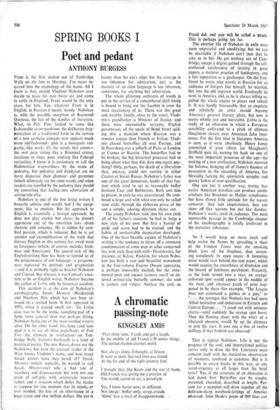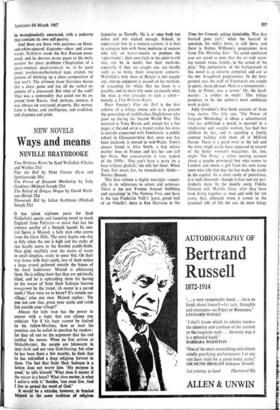Poet and pedant SPRING BOOKS I
ANTHONY BURGESS
Frant is the first station out of Tunbridge Wells on the line to Hastings. I've never in- quired into the etymology of the name. All I know is that, should Vladimir Nabokov ever decide to leave his rare Swiss air and come to settle in England, Frant would be the only place for him. For, whatever Frant is in English, in Russian it means 'dandy.' Nabokov is, with the possible exception of Raymond Queneau, the last of the dandies of literature. What, in Pale Fire, looked to some like fashionable avant-gardisme, the deliberate frag- mentation of a traditional form in the service of a new aesthetic concept, now appears much more old-fashioned : plot is a bourgeois vul- garity, like work; it's the words that count— the mot juste sitting like a Brummel cravat, locutions as rings, puns winking like Faberge curiosities. I know it is customary to call the Nabokovian waywardness by the name of pedantry, but pedantry and dandyism are no more disparate than glamour and grammar (which ultimately are the same word), and when readers are repelled by the pedantry they should try converting that feeling into admiration of aristocratic chic.
Nabokov is one of the few living writers I honestly admire and would, had I the equip- ment, like to emulate. But his approach to English is essentially a foreign approach; he does not play cricket but chess; he doesn't appreciate any of the unwritten laws about rhetoric and reticence. He is ridden by cere- bral passion, which is indecent. But he is yet another sad exemplification of the truth that literary English in this century has owed most to foreigners (which, of course, includes Irish- men and Americans). The special task of the English-writing Slav has been to remind us of the gorgeousness of our language—a gorgeous- ness repressed by puritans and pragmatists —and it is probably right to bracket Nabokov and Conrad. But whereas it was Conrad's voca- tion to be an English writer, Nabokov became the author of Lolita only by historical accident.
This accident is at the core of Nabokov's autobiography, Speak, Memory (Weidenfeld and Nicolson 36s), which has just been re- issued in a revised form. It first appeared in 1951, when it caused small stir: the Lolita case was to be the ironic launching-pad of a fame more general than was perhaps fitting, Nabokov being one of the most rarefied writers alive. On the other hand, this fame (and how mad it is to see all those paperbacks of Pale Fire—the ultimate in rarefaction—on Tun- bridge Wells Station's bookstall) is a kind of historical justice. The new Russia drove out the. Nabokovs, but even the coarsest reader in the West knows Vladimir's name, and how many Soviet writers have they heard of? Speak. Memory (which, typically, he wanted to call Speak, Mnemosyne) tells a bad tale of treachery and dispossession, but with not one grain of self-pity, with aristocratic hauteur rather, and a stoicism which defies the reader to suppose for one moment that he minds,,or ever minded, the loss of an inheritance of a huge estate and two million dollars. His eye is
keener than the axe's edge, but the courage is too inhuman for admiration, just as the mastery of an alien language is too inhuman, sometimes, for anything but admiration.
The whole glittering orchestra of words is put in the service of a remembered idyll which is bound to bring out the Jacobin in even the most reactionary of us. There was this great and wealthy family, close to the court, Vladi- mir's grandfather a Minister of Justice, and there were uncountable servants, English governesses,. all the spoils of Bond Street spill- ing into a mansion where Russian was a remoter tongue than French or Italian. Vladi- mir chased butterflies all over Europe, and St Petersburg was a suburb of Paris or London or Cannes or Biarritz. The butterflies had to be broken; the big historical processes had to bring about what they did; dare one regret any- thing? Only, perhaps, the death of a liberalism that, anyway, could not survive in either Czarist or Soviet Russia. Nabokov's father was one of the great democrats, leader of that fac- tion which tried to act as reasonable buffer between Czar and Bolshevists. Both sent him to prison; in exile he was assassinated. He com- bined a large soul with what can only be called stoic style; through the elaborate prose of the son a simple, adoring devotion shines out.
The young Nabokov took into his own exile all of his father's stoicism; he had to forge a new style of his own. But first a barrier of pride and scorn had to be erected, and the habits of uncharitable despication developed. One of the least likeable aspects of Nabokov's writing is the tendency to throw off a summary condemnation of some man or other concerned less with style than with soul—Dostoievsky, for instance, or Balzac. Pushkin, for whom Nabo- kov has built a vast and beautiful monument in the four-volume Eugene Onegin apparatus, is perhaps impossibly exalted, but the orna- mental pool and rococo statuary recall an ex- ternal aristocratic butterfly summer; the soul is earnest and vulgar. Analyse the soul, as
Freud did, and you will be called a quack. This is perhaps going too far.
The exterior life of Nabokov in exile must seem ungrateful and unedifying, but we can be charitable if Nabokov can't (not that he asks us to be). He got nothing out of Cam- bridge, except a degree gained through the self- confessed carelessness of turning in good papers, a maturer practice of lepidoptery, and a fair reputation as a goalkeeper. On the Con- tinent he wrote nine novels in Russian for an audience of émigrés like himself; he married, but into the old ingrown world. Eventually he went to America and, as he is always telling us, pulled the whole engine to pieces and rebuilt it. It was hardly foreseeable that so exquisite and scholarly an artist should become America's greatest literary glory, but now it seems wholly just and inevitable. Lolita is the study of an obsession in which a European sensibility cultivated to a pitch of ultimate Oneginism slavers over American false inno- cence. For the first time in literature America is seen, as it were, absolutely. Henry James committed it gran rifiuto (so Maugham's Driffield puts it), turning his back on one of the most important processes of the age—the making of a new civilisation; Nabokov restored the balance, bringing all of James's fineness of perception to the recording of America, but blessedly lacking his spinsterish scruples and quirky habits of over-qualification.
One can put it another way, noting that native American novelists can produce jumbo artefacts like Bruckner or Mahler symphonies but have shown little aptitude for the rococo concerto: they lack exquisiteness, they can show off like tycoons but not like dandies. Nabokov's works revel in cadenzas. The most memorable passage in the Cambridge chapter of his autobiography is totally irrelevant to the narrative substance:
`So I would heap on more coals and help revive the flames by spreading a sheet of the London Times over the smoking black jaws of the fireplace, thus screen- ing completely its open recess. A humming noise would start behind the taut paper, which would acquire the smoothness of drumskin and the beauty of luminous parchment. Presently, as the hum turned into a roar, an orange- coloured spot would appear in the middle of the sheet, and whatever patch of print hap- pened to be there (for example, "The League does not command a guinea or a gun," or ". . . the revenges that Nemesis has had upon Allied hesitation and indecision in Eastern and Central Europe . . .") stood out with ominous clarity—until suddenly the orange spot burst. Then the flaming sheet, with the whirr of a liberated phoenix, would fly up the chimney to join the stars. It cost one a fine of twelve shillings if that firebird was observed.'
That is typical Nabokov. Life is not the progress of the soul, and international politics serves only to draw the fire. Literature must concern itself with the meticulous observation of moments, rendered as cadenzas. But is it possible to create books in this way, or any word-structure at all larger than the brief lyric? Yes, if the structure of an obsession is laid down first. Butterflies can be caught, mounted, classified, described at length. Pas- sion for a nymphet will draw together all the delirium-sharp notebook-jottings of America observed. John Shade's poem of 999 lines can be wrongheadedly annotated, with a pedantry that contains its own sell-parody.
And there are those twin pastimes on black- and-white-squared diagrams—chess and cross- words. Nabokov made the first Russian cross- word, and he devotes many pages to his exilic passion for chess problems ('Inspiration of a quasi-musical, quasi-poetical, or, to be quite exact. poetico-mathematical type, attends the process of thinking up a chess composition of that sort'). The ultimate franc literature moves like a chess game and has all the verbal in- genuity of a crossword. But what of the soul? That was a commodity that could not be ex- ported from Russia. And, perhaps, anyway, it was always an overrated property, like money. Love is better, and intelligence, and erudition, and elegance and pride.



































 Previous page
Previous page